
Good morning. It’s Friday, Aug. 11.
- Anchorage mayor wants to send homeless to California.
- Regulators open floodgates to robotaxis in San Francisco.
- And Phil Mickelson is said to bet $1 billion on sports.
Statewide
1.
Dave Bronson, the mayor of Anchorage, Alaska, has proposed putting the city’s homeless on one-way flights to California this winter. The idea, he acknowledged, is an “act of desperation” in a city where homelessness has exploded, shelter beds are lacking, and winters are subfreezing. It’s not popular among those living on the street. “Alaska’s my home,” said a man at an encampment who gave his name as Joel. “How dare you? How dare you!” L.A. Times
2.
In 2019, California prisons recorded their highest rate of overdose deaths. The same year, state lawmakers approved a far-reaching plan for addiction treatment in prisons, including daily doses of medication and group behavioral therapy. Overdoses plummeted. “There’s this better understanding that if we’re going to treat the opioid overdose crisis, one of the high-target populations to treat is people in jails and prisons,” said Dr. Justin Berk, an addiction specialist. N.Y. Times
3.
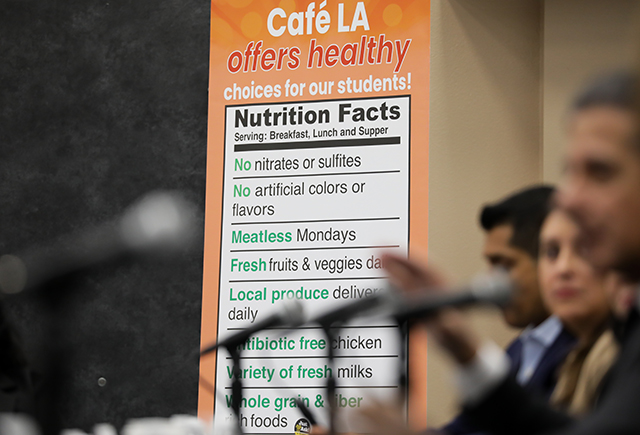
Humboldt County schools introduced meals based on local native foods such as fish, berries, and acorns.
A Bay Area school district hired a veteran of Michelin-starred restaurants as its executive chef.
Two districts in San Luis Obispo County sent cafeteria workers to train at a renowned culinary institute in Napa.
Thanks to a surge of nearly $15 billion in funding, California’s public school system has been ditching old lunch staples like frozen pizzas and chicken nuggets in favor of gourmet meals. “We now have the money and the green light to go all out. There’s no more excuses,” said Juan Cordon, food services director at Vacaville Unified. CalMatters
Northern California
4.
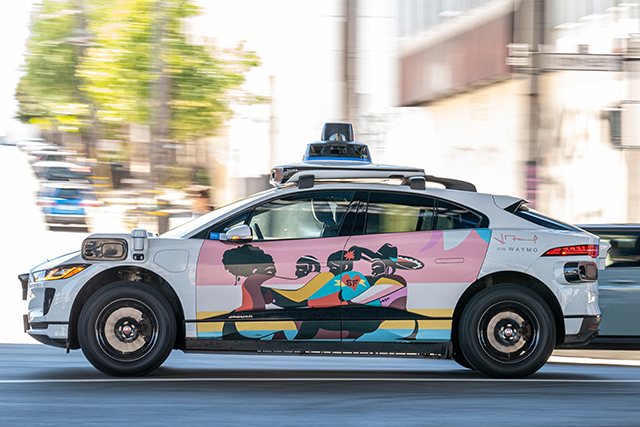
California regulators on Thursday gave two self-driving car services permission to operate throughout San Francisco at all hours over the objections of police and fire officials who said the vehicles posed unacceptable dangers. David Zipper, a transportation policy expert, portrayed the decision as a major turning point. “We’re talking about monumental impacts on how our streets work, environmental emissions, on sprawl, on equity,” he said. “The potential impacts just can’t be overstated.” Washington Post | Bloomberg
- See 55 reports of robotaxis interfering with fire department operations in San Francisco. 👉 Mission Local
5.
Court records revealed the names of two active Bay Area priests who were accused of child sexual abuse as part of a wave of litigation filed after California temporarily lifted the statute of limitations on such cases. Church leaders had fought to shield the names of the priests — Father Larry Young, of Rodeo, and Father George Mockel, of Orinda — saying the allegations were unproven and posed reputational harm. Rick Simons, an attorney for victims, said the church simply hopes to prevent more lawsuits. “It’s like the #MeToo movement,” he said. KQED
6.
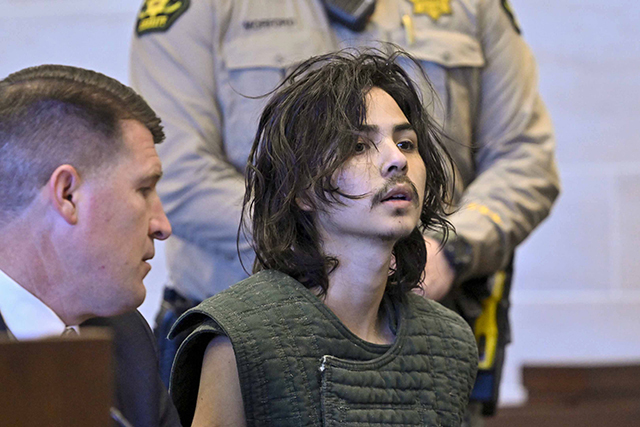
“Did it ever occur to you that he might have a mental illness?”
“Yes.”
Before he was accused of murderous stabbing spree, Carlos Dominguez was an honor student who cared for his younger siblings and dreamed of being a doctor. He began to spiral after enrolling at UC Davis. He confided to friends that he was hearing voices. He stared blankly, skipped meals, stopped bathing. Friends, scared of him, drifted away. Reporter Brittny Mejia chronicled how the warning signs of a promising young man’s descent into psychosis had been apparent for years. L.A. Times
7.
The dramatic collapse that followed the 1999 dot-com era taught investors to be wary of stock-market rallies powered by a technological boom. Yet Santa Clara’s Nvidia, a producer of semiconductors that run artificial-intelligence systems, has seen its shares nearly triple this year. “For some investors, the surge in Nvidia — now the fifth-largest U.S. company by market value—is difficult to chalk up to anything but speculative mania,” the Wall Street Journal wrote.
Southern California
8.
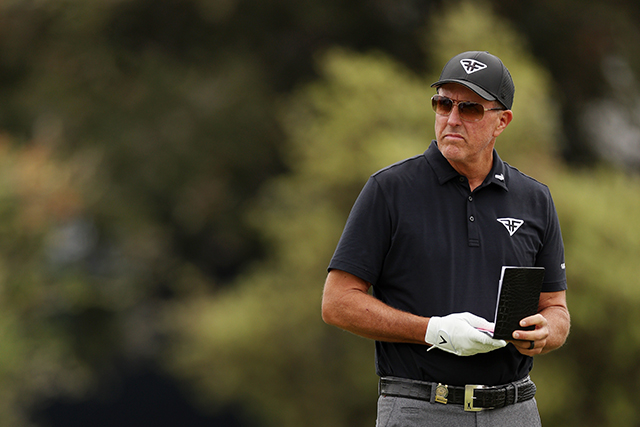
Phil Mickelson wagered more than $1 billion on sporting events over the past three decades and once tried to place a bet on a tournament he was playing in, according to a new book by professional gambler Billy Walters. Between 2006 and 2014, Walters said he and Mickelson had a gambling partnership in which the San Diego golfer would place large bets at offshore sportsbooks and the two would split the profits 50-50. Walters estimated Mickelson lost about $100 million. ESPN | Golf Digest
- The Mickelson revelations revived questions about his lucrative role in helping push the Saudi-backed league LIV Golf into existence. Sports Illustrated
9.
Brooklyn journalist Amy Larocca wrote a Style section profile of Montecito that made some readers groan — “fatuous gush,” “the journalism of privilege.” But it colorfully captured why the rich and famous are drawn to the small coastal enclave: “With the Santa Ynez mountains to the East and the Pacific Ocean to the west, and air that smells faintly of lavender and eucalyptus, Montecito is one of the rare places that looks even better in real life than it does on Instagram.” N.Y. Times
10.
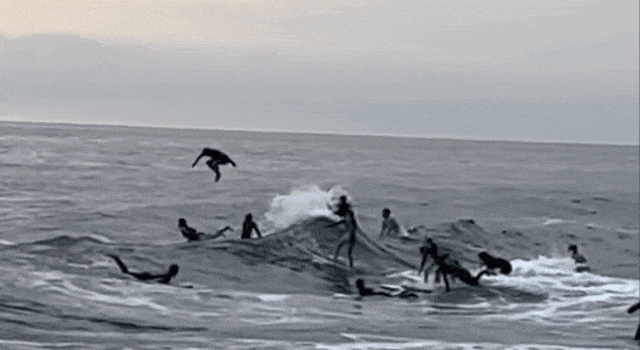
When a wave drains back to the sea after surging onto the coast, it’s known as backwash. At times, this rebound is so powerful it creates a new wave that rolls in the opposite direction and collides with incoming waves. Last week, surfer Billy Nelson posted video of a mosh pit of surfers having what looked like a blast in the backwash waves at Beacons beach in Encinitas. The Inertia described it as “absolute carnage.”
11.
On this week’s California Sun Podcast, host Jeff Schechtman talks with Kate Flannery, whose new book “Strip Tees: a Memoir of Millennial Los Angeles” tells her story of working at American Apparel in the early 2000s. A fresh graduate of Bryn Mawr, Flannery said she was tantalized by the principles the fashion label espoused: ethically made, locally sourced, sexually liberated. “But with a horny Svengali type like Dov Charney at the helm of that business model,” she said, “all the good things I loved about the company really went down in flames.”
In case you missed it
12.
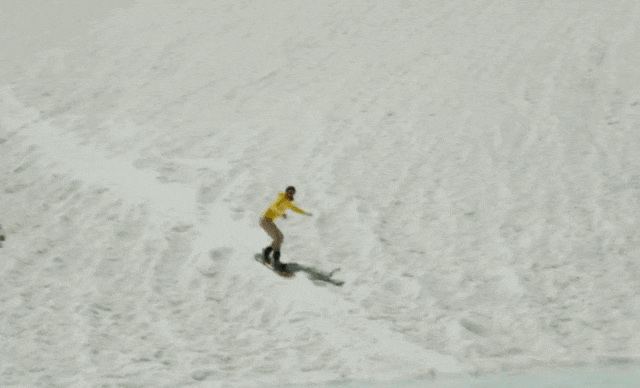
Five items that got big views over the past couple weeks:
- Every summer, a pond of turquoise snowmelt forms at the bottom of a bowl in Tahoe’s Desolation Wilderness. It provides a perfect opportunity for snowboarders to ride down a snowbank, skim across the pond, and exit gracefully back onto snow. This couple’s trip report ends in spectacular fashion. 👉 YouTube (~4 mins)
- Communities in California’s interior — including Bakersfield, Fresno, and Santa Maria — have traditionally been refuges of affordability. But since the start of the pandemic, rents in those towns have exploded by roughly 40%. CalMatters ranked California towns by their post-pandemic rent increases.
- Faced with an affordability crisis, Montana established arguably the most pro-development, pro-housing set of policies of any state. “Perhaps the biggest motivating factor — one mentioned by nearly every Montanan I spoke with — was California,” wrote Annie Lowrey. The Atlantic
- When an agent investigated a complaint about a business operating without a permit, she found violations far more disturbing. Inside the warehouse in Reedley were refrigerators filled with vials of blood; hundreds of bioengineered mice; and biological agents that included HIV, the coronavirus, and chlamydia. Fresno Bee
- One of California’s strangest homes has been listed for sale in the woods outside Santa Barbara. Built in the 1970s, the Whale House was designed to meld into the natural surroundings, with a skin of undulating cedar shingles, no flat walls, and a highly unorthodox floor plan. Design Boom | Dirt
Get your California Sun T-shirts, phone cases, hoodies, mugs, and hats!

Thanks for reading!
The California Sun is written by Mike McPhate, a former California correspondent for the New York Times.
Make a one-time contribution to the California Sun.
Give a subscription as a gift.
Get a California Sun mug, T-shirt, phone case, hat, or hoodie.
Forward this email to a friend.
Click here to stop delivery, and here to update your billing information. (Note: Unsubscribing here does not cancel payments. To do that click here.)
The California Sun, PO Box 6868, Los Osos, CA 93412
Wake up to must-read news from around the Golden State delivered to your inbox each morning.
